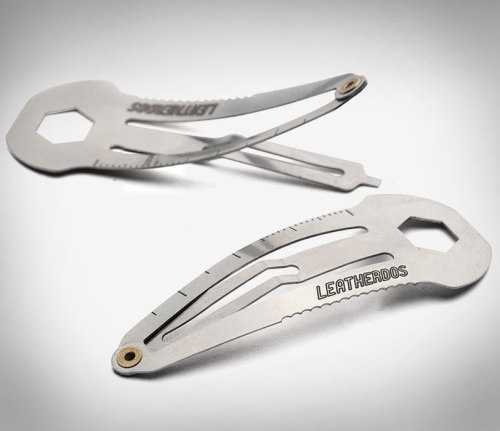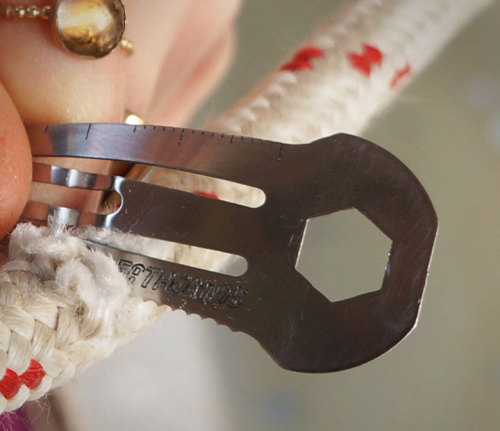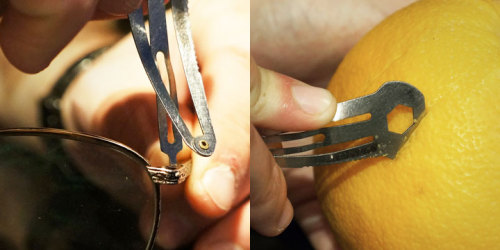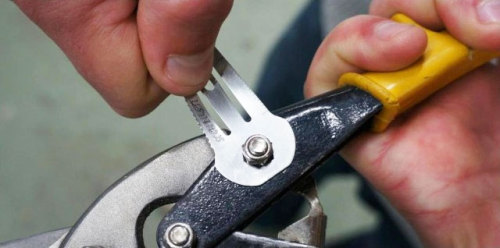A Group Of About 100 People Rallied Outside The Canadian Museum For Human Rights In Winnipeg On Saturday

A group of about 100 people rallied outside the Canadian Museum for Human Rights in Winnipeg on Saturday to call on the federal government to make a major pivot away from fossil fuels.
The Liberal government has pledged to move the country toward a post-carbon economy, and organizers of Saturday’s rally want to see a plan to make that happen.
Instead, governments are putting the responsibility for solving the climate crisis on the backs of individuals, said one attendee.
“The evidence that climate change is caused by humans and is causing extreme weather events and other catastrophic results is not deniable, so we need to take action because this is a crisis,” said Melanie Dennis Unrau, a volunteer with the Manitoba Energy Justice Coalition.
Continue Reading.
Tagging: @politicsofcanada
More Posts from Green-notebooks and Others





The Leatherdos is a hair clip that doubles as a multi-tool that combines 5 different tools in a tiny hair clip: screw-drivers, a wrench, a trolley coin, a ruler, and a cutting edge.
—->http://odditymall.com/leatherdos-is-a-hair-clip-multi-tool
You know what line gets me every time I watch MAD MAX FURY ROAD?
“Do not, my friends, become addicted to water. It will take hold of you, and you will resent its absence.”
Think about that. “Addicted to water.” It makes it sound like water is an extra luxury that people don’t need but are greedy for, something they should be able to go without, and if they are desperate for it, it’s their own fault, and not the fault of the man who has all of it, and withholds it.
Think about how the people in power tell us not to be greedy for the things we need, like healthcare, like a living wage, like the right to be free of fear and violence in our own communities. The people in power tell us not to be greedy for these things, when they themselves already enjoy them freely, and withhold them from us.
Don’t trust the narrative that tells us we’re being greedy by asking for things that we need.
Don’t trust the asshole sitting on a grassy hilltop with his hand on the spigot telling us not to be greedy for water.

Programmers are the greatest browsing community (SO mostly)…We can singlehandedly save the planet.

“The project was designed to transform a wide, automobile-oriented thoroughfare to a pedestrian-friendly, neighborhood center.
Travel lanes were reduced from five to two while adding five modern roundabouts, improved sidewalks, medians, landscaping, and increased angle parking. Traffic calming measures were installed on less busy side and parallel streets to avoid potential traffic diversion.“
Here’s the before and after:


“Pedestrians once had 70 feet of pavement to cross at intersections. With the roundabouts, they now cross 12–14 feet of pavement at a time with refuge islands in the middle”
“due to the 15 mph design speed of the roundabouts and traffic calming, many bicyclists feel comfortable riding with traffic on La Jolla Boulevard“
“The traffic count remained approximately the same (23,000 vehicles per day before, 22,000 after), but walking, bicycling, transit use, on-street parking and retail sales all climbed to much higher levels, the city reports. Retail sales rose 30 percent and noise levels dropped 77 percent. Because traffic moves slower, businesses report higher visibility.
As a result of the roundabouts and traffic calming, speeds were reduced from 40–45 mph to 19 mph, according to city transportation engineers. “The once busy boulevard has been transformed into a slow-paced street with roundabouts, landscaped street dividers and diagonal parking,” notes the LaJolla Light
Traffic crashes fell by 90 percent. The project has helped revitalize La Jolla Boulevard, acting as a catalyst to several new mixed-use developments, a 139-unit condominium development, and a major drugstore.
“Motorists,” Burden reported in The San Diego Union- Tribune in February 2017, “understandably dreaded this change before it was made. But they found that instead of waiting 24 seconds for a pedestrian to cross 70 feet of road, they now only wait 3–4 seconds, or don’t have to wait at all. Businesses that feared the loss of customers arriving in cars actually improved their trade. … Today motorists are getting to their destinations in less time, because they aren’t stopping.”“
(I’ve added bold for emphasis; the above sections are taken from different parts of the article, click through the link for the whole thing)
This goes to show that designing for a better pedestrian experience is not only safer, but also good for the local economy.
What do you think of vertical axis wind turbines? Seems to me they'd complement small domestic PV installations nicely and could use some wider usage
I’ve heard some people get quite preachy about vertical axis wind turbines being no good, but personally I’m rather fond of them. I definitely agree that for domestic use, they make more sense than regular windmills. They’re also much better suited to urban environments.
The typical style of wind turbines are great when you have lamellar flowing air currents, like near the coast or on flat plains, but city wind is more gusty and turbulent. Vertical axis turbines definitely seem ideal for that!
I think some of the reservations people have stem from the fact that, in the past, vertical axis wind turbines have typically been less reliable, and the turbine blades are more prone to fatigue. Though using modern engineering materials and turbine designs, I’m not convinced those old problems still apply.
Some designs for small scale applications are also impressively discreet and quiet – though seemingly rather expensive!
Succulent Care Guide
I see a lot of people killing their succulents due to ignorance of how to care for them. Here’s a quick guide!
Lighting: Most* succulents require full sun, meaning they need direct sunlight for 4-6+ hours a day. South or west-facing windows are ideal for succulents. You can also move your succulent around windows throughout the day to give as much light as possible, if you want.
If your succulent has previously not received enough light, GRADUALLY give it more and more sun over two weeks. This will prevent sunburn.
Failure to give your succulent proper lighting will result in etiolation – a process in which your plant will grow lanky, weak stems in an attempt to find more light.
If you can’t provide enough light, succulents probably aren’t right for you. Look into lower light plants, such as pothos or peace lily!
Type of Pot: Succulents need a pot with a drainage hole. End of story. No rocks in the bottom will help, no bullshit. Drainage. Hole.
Size of Pot: Pick a pot no more than one inch larger than your plant’s rootball. Overpotting will kill your plant. Oversized pot = too much soil = more water than your plant can use = death from root rot.
Soil: Regular potting soil is terrible for succulents as it’s water-retentive. Succulents like well-draining soil with lots of perlite or pumice, and gritty ingredients such as fine bark or turface. Look for a cactus&succulent soil mix, or just improve regular soil by adding 50% perlite. Avoid anything with peat moss! Avoid MiracleGro.
Time to Water: Find a wooden toothpick for small pots, or a wooden dowel for larger ones. Insert the wood into the soil. If it comes out wet, with damp soil sticking to it, it’s not time to water yet. If it comes out clean and dry, your succulent is thirsty! Think of checking brownies with a toothpick to see if they’re done baking.
This is recommended because often times your finger cannot feel the soil towards the bottom of the pot, and you need to make sure all of the soil is dry before watering.
DO NOT WATER ON A SCHEDULE. DO NOT RELY ON A WETNESS METER (THEY ARE INEFFECTIVE). DO NOT WATER DAILY. Listen to your plant!
How to Water: When your succulent’s soil is dry, water thoroughly, until water drains out of the drainage hole. Allow all excess water to drain before putting it back into any saucers or decorative pots.
*Some succulents’ lighting needs may vary – such as Haworthias with “windows” in their leaves, who don’t like as much sun, or Sempervivums who need much more sun than most. Look up your specific plant’s care to be sure!
Does anyone know how to become a farmer?
I’m open to anything please help








Blue Pixie’s Parasol (Mycena Interrupta) or subspecies.
Mycena interrupta, commonly known as the pixie’s parasol, is a species of mushroom. It has a Gondwanan distribution pattern, being found in Australia, New Zealand, New Caledonia and Chile. In Australia it is found in Victoria, Tasmania, New South Wales, and South Australia, and in Queensland where its distribution is limited to Lamington National Park. Description The caps of Mycena interrupta range from 0.8 to 2 cm, and they are a brilliant cyan blue colour. They are globose when emergent and then become a broad convex as they mature, with the centre of the cap slightly depressed. The caps are often sticky and appear slimy looking, particularly in moist weather.
it's weird how people will be like "but we need Suburban Lawn so kids can play outside!" as if basically every kid isn't bored to tears by being confined to a yard that's nothing but flat grass.
like have you talked to a kid, have you spent time with kids, do you remember BEING a kid? "playing outside" isn't about Throwing Ball 1000 times it's about squishing mud, using sticks as swords and guns, making potions from plants, catching bugs, climbing trees, and building forts from brush and branches.
A highly manicured lawn has nothing to offer the senses and brain of a developing child. If there are no "weeds," what are they supposed to gather to make into potions?? I'm not even joking, what do you, a child, DO in a yard without wildflowers and mud and dead branches. I feel like my brain wouldn't have developed correctly if my outdoor space growing up wasn't full of chicory and asters and dandelions.
At least video games offer some dim imitation of a variety of stimuli
-
 yesitsanusha reblogged this · 3 years ago
yesitsanusha reblogged this · 3 years ago -
 yesitsanusha liked this · 3 years ago
yesitsanusha liked this · 3 years ago -
 kamorth reblogged this · 3 years ago
kamorth reblogged this · 3 years ago -
 jezebelgoldstone reblogged this · 3 years ago
jezebelgoldstone reblogged this · 3 years ago -
 cryptically-cryptic-cryptid liked this · 3 years ago
cryptically-cryptic-cryptid liked this · 3 years ago -
 un-amorost liked this · 3 years ago
un-amorost liked this · 3 years ago -
 vividsolitude reblogged this · 3 years ago
vividsolitude reblogged this · 3 years ago -
 tumbumtale liked this · 3 years ago
tumbumtale liked this · 3 years ago -
 galactic-dragon-pathex liked this · 3 years ago
galactic-dragon-pathex liked this · 3 years ago -
 prismagramauthor liked this · 3 years ago
prismagramauthor liked this · 3 years ago -
 bsmadness reblogged this · 3 years ago
bsmadness reblogged this · 3 years ago -
 bsmadness liked this · 3 years ago
bsmadness liked this · 3 years ago -
 ceasarslegion reblogged this · 3 years ago
ceasarslegion reblogged this · 3 years ago -
 sciencetylia reblogged this · 3 years ago
sciencetylia reblogged this · 3 years ago -
 cafekat91 liked this · 3 years ago
cafekat91 liked this · 3 years ago -
 a4tog6 liked this · 3 years ago
a4tog6 liked this · 3 years ago -
 aroacebones reblogged this · 3 years ago
aroacebones reblogged this · 3 years ago -
 whatdoyoumeanitsnotawesome reblogged this · 3 years ago
whatdoyoumeanitsnotawesome reblogged this · 3 years ago -
 lizzypuppet1711 liked this · 3 years ago
lizzypuppet1711 liked this · 3 years ago -
 ruefulstars liked this · 3 years ago
ruefulstars liked this · 3 years ago -
 biveganpoetbat liked this · 3 years ago
biveganpoetbat liked this · 3 years ago -
 moss-glyph liked this · 3 years ago
moss-glyph liked this · 3 years ago -
 carenmisty reblogged this · 3 years ago
carenmisty reblogged this · 3 years ago -
 whatdoyoumeanitsnotawesome liked this · 3 years ago
whatdoyoumeanitsnotawesome liked this · 3 years ago -
 vesicapiscisfatuous reblogged this · 3 years ago
vesicapiscisfatuous reblogged this · 3 years ago -
 vesicapiscisfatuous liked this · 3 years ago
vesicapiscisfatuous liked this · 3 years ago -
 the-definition-of-sin reblogged this · 3 years ago
the-definition-of-sin reblogged this · 3 years ago -
 the-definition-of-sin liked this · 3 years ago
the-definition-of-sin liked this · 3 years ago -
 running-batty liked this · 3 years ago
running-batty liked this · 3 years ago -
 delirious-deer liked this · 3 years ago
delirious-deer liked this · 3 years ago -
 waldbekranzt liked this · 3 years ago
waldbekranzt liked this · 3 years ago -
 fizzybunches reblogged this · 3 years ago
fizzybunches reblogged this · 3 years ago -
 litchifairy liked this · 3 years ago
litchifairy liked this · 3 years ago -
 ethankyou reblogged this · 3 years ago
ethankyou reblogged this · 3 years ago -
 accidentalyoga reblogged this · 3 years ago
accidentalyoga reblogged this · 3 years ago -
 nightmarecait reblogged this · 3 years ago
nightmarecait reblogged this · 3 years ago -
 therabbit-isa-sith liked this · 3 years ago
therabbit-isa-sith liked this · 3 years ago -
 beedok liked this · 3 years ago
beedok liked this · 3 years ago -
 sparklyfirebouquet liked this · 3 years ago
sparklyfirebouquet liked this · 3 years ago -
 thoughtportrait liked this · 3 years ago
thoughtportrait liked this · 3 years ago -
 partybuns reblogged this · 3 years ago
partybuns reblogged this · 3 years ago -
 sharpandpointies liked this · 3 years ago
sharpandpointies liked this · 3 years ago -
 i-am-thornqueen liked this · 3 years ago
i-am-thornqueen liked this · 3 years ago